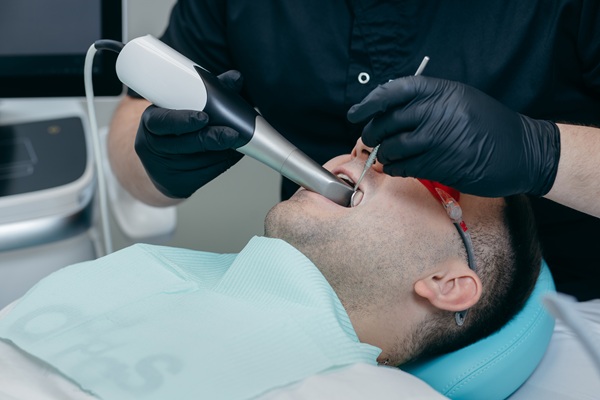4 Questions to Ask a Periodontist

You may have heard of a periodontist, but you may not be quite sure what one is. A periodontist is a dental professional that specializes in the diagnosis, treatment, and prevention of periodontal disease, also known as gum disease. A periodontist has the skills necessary to treat all types of issues relating to the gums, and he or she can also treat associated issues that may occur if the periodontal disease reaches the severe stages.
Questions to ask a periodontist
If you are concerned about gum disease, it is important to seek early treatment. A periodontist can answer any questions you may have about gum disease, the associated symptoms, and treatment options.
1. What is periodontal disease?
Periodontal disease occurs when a buildup of bacteria on the teeth causes an infection of the surrounding gum tissue. There are three stages of gum disease, and if it is caught early, it can be easily treated. Once the infection gets worse and spreads, it is impossible to reverse, and the treatments are generally more invasive.
2. What are the signs of gum disease?
During the early stages, the gums may seem swollen and red. You may also notice frequent bleeding when you brush or floss. As the disease progresses, you may notice pain, and the gums will begin to recede from the teeth. During later stages, the infection can get into the jawbone, which may result in loose teeth that eventually fall out if the infection is not treated. Additional signs and symptoms of periodontal disease include:
- Chronic bad breath
- Toothache
- Pain while chewing
- Pus-filled sores along the gums
- Sensitive teeth due to nerve exposure
3. How do you treat gum disease?
The treatment method that a periodontist uses depends on the severity of the infection. At the first sign of the disease, better brushing and flossing techniques may be all that is needed. If this is not sufficient, a deep cleaning, also known as scaling and root planing, is performed.
During the advanced stages of gum disease, the periodontist may need to perform surgery to get rid of the bacteria and infection. Some options include flap surgery, gum graft surgery, bone graft, guided tissue regeneration, and bone surgery.
4. What are the options if a missing tooth needs to be replaced?
If the gum disease gets so bad, an affected tooth may fall out, or it may need to be extracted due to the infection. There are various options for replacing a tooth, but a dental implant is a popular choice. A periodontist has the training to place an implant as well.
Conclusion
Gum disease is common, and, although it is easily treated in the early stages, it becomes much more challenging to treat once it progresses to the advanced stages. A periodontist can treat the disease at any stage, and he or she can also give the advice to help prevent it from occurring in the first place.
If you have gum disease, it is important to schedule an appointment with a periodontist to get treatment right away. To see what your options are, schedule a consultation with our office.
Check out what others are saying about our dental services on Yelp: Periodontics in Boca Raton, FL.
Recent Posts
Oral cancer screenings can lead to early detection and less invasive treatment. This quick and painless process enables dental providers, such as periodontists, to detect signs of abnormal tissue changes that may indicate or develop into oral cancer. Through these screenings, patients can better understand their risks and take proactive steps to maintain both oral…
Appearance may be one of the first things people think about when it comes to tooth replacement. However, improved appearance is just one of the many benefits of replacing missing teeth. Tooth replacement can be key to improving not only how you feel about your smile but also boosting your oral health.Whether one chooses dentures,…
Wondering whether a periodontist can treat receding gums? Read on to learn more. Due to the increasing awareness about dental hygiene, many people are worried about gum recession. This issue is not just cosmetic: It may signal underlying dental problems that could cause serious health problems if ignored. Although routine dental care such as brushing,…
An oral surgeon might recommend the sinus lift procedure if your jawbone needs to be built up so it can hold dental implants. Also known as a sinus bone graft, the treatment is used to build bone tissues in the upper jaw. Oral surgeons or periodontists typically perform the procedure. Patients need to be fully…


